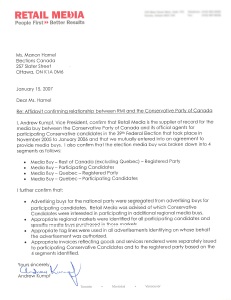There is a faux controversy brewing in the media and among Liberal bloggers about Conservative ads that ran in the last election. As all parties do during elections, money was transfered between the national party and regional candidates. Conservatives ran their air war well and it was merely one piece of the strategy that paid off for the party that would form government after the contest on January 23rd 2006. Liberals allege that local campaigns funded “national” advertising and that the national campaign funded local ads which were national-like.
In the wake of this constructed controversy, Conservatives have responded by saying that “tag lines” in advertising attributed the ads to local candidates.
The Conservatives also claim that ads tag-lined with the names of local candidates ran locally. The Liberals, however, contest this local claim and also challenge the content of the ads and whether they are local in scope.
For all intents and purposes (but somehow is not approved under the Elections Act) a party could run 30 seconds of dead air and tag the ad to indicate that it was approved by the official agent for Jane or Joe Local, the Conservative/Liberal or NDP candidate. However, section 407 paragraph 1 of the Canada Elections Act states:
407. (1) An election expense includes any cost incurred, or non-monetary contribution received, by a registered party or a candidate, to the extent that the property or service for which the cost was incurred, or the non-monetary contribution received, is used to directly promote or oppose a registered party, its leader or a candidate during an election period.
Election expenses are incurred by local campaigns. Local campaigns bought local advertising to “promote or oppose a registered party, its leader or a candidate during an election period”. So, 30 seconds of dead air wouldn’t be allowed… but, a commercial promoting Stephen Harper and/or opposing Paul Martin is certainly allowed if it is paid for and tagged by the local campaign.
The Tories have kept their noses clean by purchasing separate ad buys for the national and local campaigns (national ads purchased by the national campaign and local ads purchased by the local candidates).
The Liberals may dispute the separate nature of the advertising purchases.
Here’s a signed letter from the advertising company commissioned by the Tories during the 2005/2006 writ period.
In the letter, it states:
– Advertising buys for the national party were segregated from advertising buys for participating candidates. Retail Media was advised of which Conservative Candidates were interested in participating in additional regional media buys.
– Appropriate regional markets were identified for all participating candidates and specific media buys purchased in those markets.
– Appropriate tag lines were used in all advertisements identifying on whose behalf the advertisement was authorized.
– Appropriate invoices reflecting goods and services rendered were separately issued to participating Conservative Candidates and to the registered party based on the 4 segments identified.
and those 4 segments were:
– Media Buy – rest of Canada (excluding Quebec) – Registered Party
– Media Buy – Participating Candidates
– Media Buy – Quebec – Registered Party
– Media Buy – Quebec – Participating Candidates
So, the Conservative Party (national campaign) and the candidates (local campaign) were separately invoiced. It seems that all of the t’s were crossed and i’s dotted. Given that transfers of cash between local campaigns and the national campaign are perfectly legal, where’s the scandal here? Can somebody cite a section of statute or law that has been broken here?
